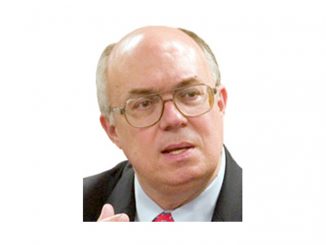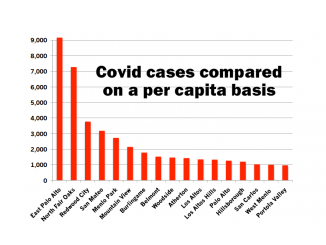
BY EMILY MIBACH
Daily Post Staff Writer
A sales tax measure proposed by Santa Clara County Supervisor Cindy Chavez effectively died yesterday (July 21), after two other supervisors said they will not support it.
Chavez wanted to place a five-eighths of a cent measure on the Nov. 3 ballot to help the county government deal with the cost of the coronavirus lockdown and subsequent economic recession. It was described as a temporary tax that would last five years.
Chavez asked her fellow supervisors today to forward the issue to the board’s Aug. 6 meeting so County Counsel James Williams’ team can look into the measure further. The board voted 3-2, with Supervisors Joe Simitian and Mike Wasserman dissenting.
Placing a tax measure on the ballot requires at least four “yes” votes, and with both Simitian and Wasserman dissenting, the tax will likely not appear on the ballot when the final vote takes place Aug. 6.
Chavez said she brought the tax to the rest of the board because she does not think the state or federal governments will give the county any more money. The county is looking at a minimum of a $320 million shortfall, according to County Manager Dr. Jeff Smith.
The tax would allow the county to continue providing essential services and help people from getting sick, going hungry or homeless, Chavez said.
But most of Chavez’s colleagues weren’t excited about the idea.
Supervisor Susan Ellenberg provided a list of topics she wants Williams’ report to address, including how the tax would affect other tax measures on the ballot, including the potential Caltrain eighth-of-a-cent sales tax measure.
Ellenberg also pointed out that a tax for a specific purpose can only be approved with a two-thirds of the vote, while a tax that would go into the county’s general fund to be used for any governmental purpose only requires majority approval. Yet this tax would be advertised as a way to pay for COVID-19-related expenses but county officials are saying it would only need a majority vote for passage. Ellenberg wanted the county’s legal team to explain that.
Tax called regressive
Supervisor Joe Simitian and Ellenberg both expressed their distaste for placing a sales tax measure on the ballot, both calling such a tax regressive, as poorer people end up paying a larger percentage of their income on it than people who earn more.
“We would be asking those who can least afford to do so, to help us bail them out,” Ellenberg said.
Chavez, a former labor leader in the county, said that the tax is aimed to help people, so it’s regressive nature will be negated by its benefits.
Supervisor Simitian pondered whether the tax, which Chavez said would last five years, would actually last longer. Simitian reflected on Measure A, which was approved in 2012, and when it came to be renewed or end, the board made the tax permanent.
“I know it’s for a limited period of time now, but once the funds are committed, I’m not convinced it wouldn’t become a permanent tax, just by simple political inertia,” Simitian said.
Simitian also said he has seen two similar attempts to raise the sales tax in the county over the past two or three years.
Supervisors like split-roll
While three of the five supervisors raised concerns with the sales tax measure, all but Wasserman were in favor of endorsing state Prop. 15, which would amend 1978’s famous Prop. 13 in order to raise property taxes on commercial property. Prop. 15 is also known as the “split roll” proposition because it would take the county property tax roll and divide it into two — one for homeowners and another for businesses — with different tax rates for each.
After the board decided on one sales tax, it deferred its decision on another, the eighth-of-a-cent sales tax measure that Caltrain wants to place on the ballot.
Supervisor Ellenberg had to leave the meeting to attend a town hall meeting she had set up well ahead of yesterday’s special board meeting. Due to that, Simitian suggested the board postpone its vote on the issue to the board’s Aug. 6 meeting.
That’s cutting it close since all November ballot measures must be submitted to the county elections office by Aug. 7.
Caltrain dispute
Caltrain says that without the approval of its tax, the railroad will shut down by the end of the year.
Controversy has broken out in the past week over whether the measure will make it on the ballot at all. San Francisco Supervisors Shamann Walton and Aaron Peskin decided last week not to hold a vote on the resolution.
San Francisco wants more control over the railroad, which is run by San Mateo County’s SamTrans. The Caltrain baord doesn’t even have authority to hire or fire the executive director of Caltrain, currently former Redwood City Mayor Jim Hartnett.
Caltrain needs seven boards from the railroad’s three counties to agree to put the measure on the ballot.
Between now and Aug. 7, the boards of supervisors in Santa Clara, San Mateo and San Francisco counties must agree to put the tax on the ballot, along with transportation agencies in the three counties, and the Caltrain board itself.
So far, only San Mateo County’s Board of Supervisors and the SamTrans board have given the OK to place the measure on the ballot.
New Caltrain proposal postpones governance resolution
Yesterday, Walton, Peskin, Chavez and other elected officials from San Francisco and Santa Clara County released a counter-proposal to the proposed tax that would put an estimated $100 million into Caltrain’s accounts annually. Officials in those two counties are not pleased with the current governance set up with Caltrain, where SamTrans and Caltrain share employees and a top manager, Hartnett.
“Caltrain’s current governance and management structure require significant change to facilitate these processes and outcomes. In particular, we must ensure equitable representation for Santa Clara and San Francisco counties, which together comprise nearly 80% of anticipated sales tax proceeds,” the joint statement says.
The proposal by San Francisco and Santa Clara County officials would create a special Caltrain escrow fund where the money would be released to Caltrain as it meets benchmarks related to solving the governance issues or the electrification of the tracks is completed.
In the first year, $40 million would be released to Caltrain so it can keep the lights on. The board then has until Sept. 21, 2021, to decide on how to rectify the governance issue.
If that does not happen, another $40 million will be dispersed to Caltrain and the board will have until the end of the year to figure out the governance question. If that does not happen, the board will have to work with the state Legislature to sort out the issue.
Supervisor Walton in San Francisco introduced the resolution today, and it will be considered by the full San Francisco Board of Supervisors next Tuesday.
This resolution was briefly mentioned by Santa Clara County Supervisor Chavez during her board’s meeting, and will also come before that board on Aug. 6.
Santa Clara County Supervisor Dave Cortese appeared interested in a measure that would deal with the governance issue, he said. He said the governance of Caltrain has been an issue for years.
Wasserman said he would not support any tax measure. But Simitian, who represents Palo Alto and northern Santa Clara County, said he is interested in the San Mateo County version of the measure that gives the entire $100 million to Caltrain.
Earlier in the day, State Senator Jerry Hill, D-San Mateo, and Simitian’s former colleague in the Legislature, sent a letter to the Santa Clara County Supervisors urging them to pass the San Mateo County-approved resolution.
Hill wrote the legislation that allows for the Caltrain tax. He says that the new conditions that have been proposed are outside of what his legislation approved.
Which measure is placed on the ballot will be determined in the next two weeks. The three counties must approve a measure by Aug. 7.




The county refuses to lay-off any employees and then says it wants a tax increase to be paid by people who have lost their jobs. That takes chutzpah.
Caltrain should live within its current budget and not ask us to subsidize their riders with a tax.
Disgusting that the supervisors would use the coronavirus as a way to increase taxes for FIVE YEARS! Do they think the shutdown will continue for 5 years? No, they’re just trying to trick us. I’m glad Joe Simitian is there to stop things like this.
[Comment removed — please don’t accuse others of breaking the law. And claiming that another media outlet reported it doesn’t make it a fact.]